Antibiotics can’t cure COVID-19: What you need to know
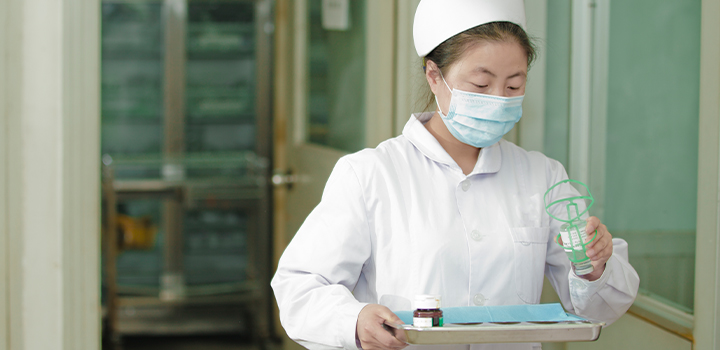
Antibiotics are not effective in preventing or treating the 2019 coronavirus that causes the respiratory illness known as COVID-19. What’s more, misusing antibiotics can result in them not working due to the development of antimicrobial resistance. Try these supportive care and preventive measures instead.
Antibiotics cannot prevent or treat coronavirus 2019
Antibiotics are not effective in preventing or treating the 2019 coronavirus that causes the respiratory illness known as COVID-19. What’s more, misusing antibiotics can result in them not working due to the development of antimicrobial resistance. Try these supportive care and preventive measures instead.
Antibiotics cannot prevent or treat coronavirus 2019
With so many myths and misconceptions around coronavirus 2019, it’s important to understand that COVID 19 is caused by a virus and therefore cannot be treated with antibiotics.
“Antibiotics do not work against any virus, whether it’s the seasonal influenza virus or the new 2019 coronavirus,” says Dr Noluthando Nematswerani, Discovery Health’s Head of the Centre for Clinical Excellence. “Antibiotics only work on bacterial infections, so they cannot prevent or treat coronavirus 2019.”
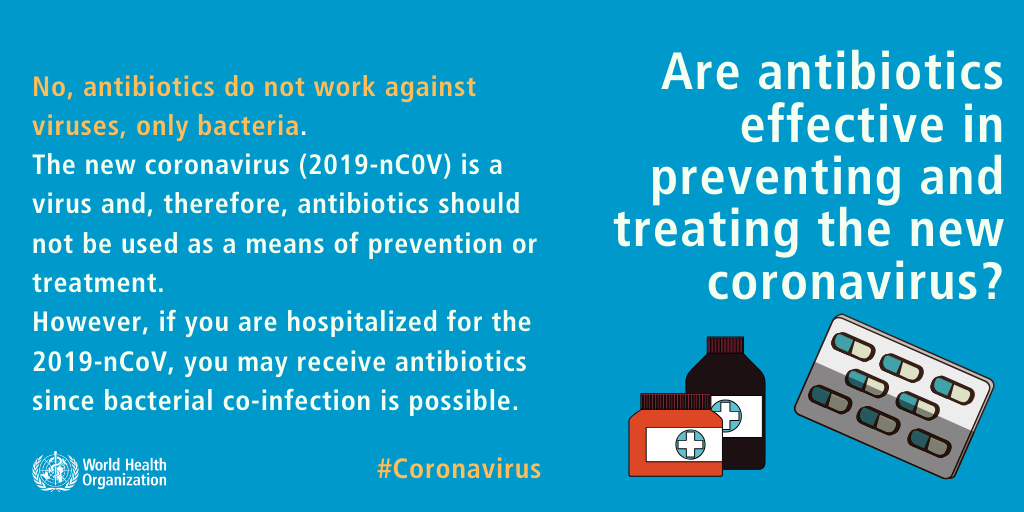
Infographic: World Health Organization
Overusing antibiotics may lead to resistance
What’s more, if you use antibiotics incorrectly, you could contribute to antimicrobial resistance or, in other words, bacteria becoming more difficult or impossible to treat with antibiotics.
“The persistent overuse and misuse of antibiotics have encouraged the emergence and spread of antimicrobial resistance,” says Dr Roshini Moodley Naidoo, Head of Risk Management and Quality of Care at Discovery Health. “This occurs when microbes, such as bacteria, become resistant to the medicine used to treat them. Misuse refers to cases where antibiotics, which are meant to treat bacterial infections, are dispensed to people with viral infections like colds and flu.”
Read more about antimicrobial resistance or listen to the podcasts:
So, how can we fight coronavirus 2019?
At the moment, we don’t have approved antiviral treatments or medicines for COVID-19. The supportive management of confirmed COVID-19 is guided by a patient’s symptoms and signs.
Supportive care involves:
- Getting plenty of rest and drinking water to help your body stay hydrated, fight the infection and speed up recovery.
- Controlling your fever through over-the-counter prescribed medicine like paracetamol or other non-steroidal anti-inflammatories.
Cultivate healthy habits to strengthen your immune system
What else can we do? “There is no approved treatment available at the moment, but through early detection and taking preventive measures, we can manage COVID-19 effectively,” Dr Nematswerani says.
By developing healthy habits, you can strengthen your immune system and avoid getting coronavirus 2019. Here’s how:
- Wash your hands often with soap and water for at least 20 seconds, or use a hand sanitiser that contains 60%–95% alcohol.
- Avoid close contact with people who are sick.
- Avoid touching your eyes, nose, and mouth with unwashed hands.
- Stay home if you are feeling sick.
- Cover your mouth and nose when you cough or sneeze with clothing, a flexed elbow or a tissue. Throw away the tissue immediately and wash your hands afterwards.
- Follow World Health Organization guidelines on wearing a face mask.
- Clean and disinfect objects and surfaces that you or others touch often, using a household cleaning spray. The virus can survive on common surfaces such as plastics, ceramics, glass and stainless steel for three days and longer.
- Avoid eating raw or undercooked animal products and do not eat the meat that comes from animals that have died of diseases.
US Centres for Disease Control and Prevention. Coronavirus 2019: Prevention and Treatment. Link: https://www.cdc.gov/coronavirus/2019-ncov/about/prevention-treatment.html
World Health Organization. Coronavirus disease (COVID-19) advice for the public: Myth busters. Link: https://www.who.int/emergencies/diseases/novel-coronavirus-2019/advice-for-public/myth-busters
ALL MEDICAL INFORMATION FOUND ON THIS WEBSITE INCLUDING CONTENT, GRAPHICS AND IMAGES, IS FOR EDUCATIONAL AND INFORMATIONAL OBJECTIVES ONLY. DISCOVERY HEALTH PUBLISHES THIS CONTENT TO HELP TO PROTECT AND EMPOWER ALL SOUTH AFRICANS BY PROMOTING A BETTER UNDERSTANDING OF COVID-19.
Find a healthcare professional near you
Find a doctor or hospital near you online or by using the Discovery app.
Related articles
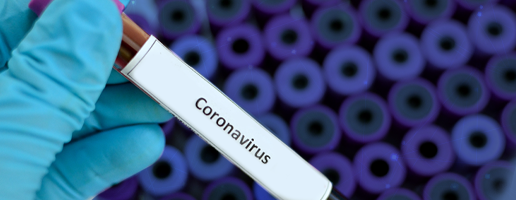
Outbreak of the 2019 novel coronavirus
The 2019 novel coronavirus (2019-nCoV) has caused an outbreak of fatal respiratory illness first detected in Wuhan, China. This is a completely new strain with no vaccines available. The best way to prevent infection is to avoid being exposed to this virus.
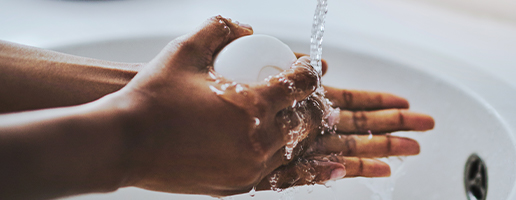
Understand the Novel Coronavirus (COVID-19) and prevent infection
No country is immune to the spread of the Novel Coronavirus - officially named COVID-19 by the World Health Organization (WHO). The outbreak has reached pandemic proportions and been declared a global public health emergency.
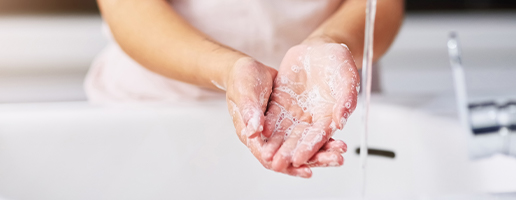
Novel Coronavirus - wash your hands of the threat
As toddlers, we learnt to wash our hands. But, did we ever master the skill to the extent that is needed to wash pathogens off our hands, and save lives? Multiple studies show people don't wash their hands at the right times, in the right way or for the right amount of time. We contaminate the things and people we touch with the germs we carry on our hands.